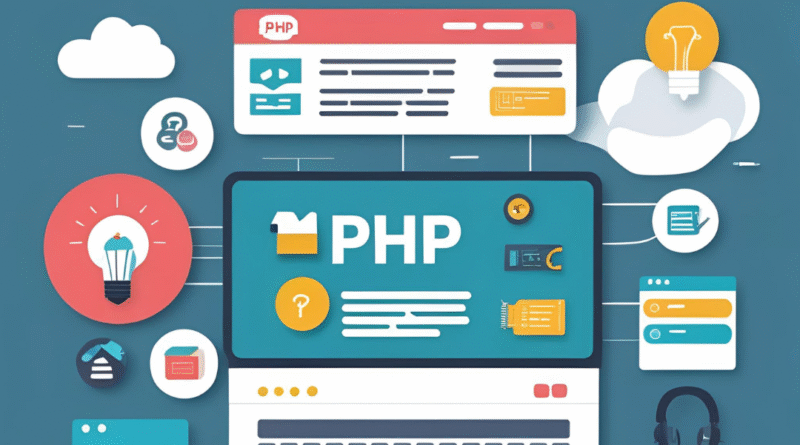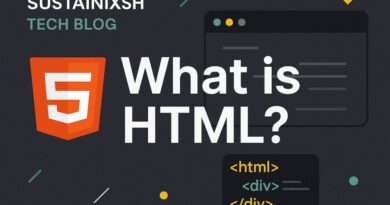Introduction to PHP:- PHP vs. Node.js, Python, ASP.NET
PHP: Your Gateway to Dynamic Web Experiences
Ever wondered how websites aren’t just static pages but respond to your clicks, show personalized content, and connect with databases? That’s where server-side scripting languages come in, and one of the oldest and most widely used is PHP (Hypertext Preprocessor).
At its core, PHP is an open-source scripting language primarily designed for web development. It’s unique because its code can be directly embedded within HTML, making it incredibly versatile for generating dynamic web pages. When you visit a PHP-powered website, the server processes the PHP code first, then sends the resulting plain HTML back to your browser. This “behind-the-scenes” magic allows for features like:
- Form Handling: Collecting and processing data submitted through web forms.
- Database Interaction: Storing, retrieving, and managing information in databases (like MySQL, PostgreSQL, etc.). This is crucial for things like user accounts, e-commerce products, and content management systems.
- Dynamic Content Generation: Displaying different content to different users, or updating content based on real-time data.
- Session Management: Keeping track of user activity across multiple pages, essential for login systems and shopping carts.
- Creating APIs: Building the backbone for mobile apps and other web services.
In essence, PHP helps transform a static website into a vibrant, interactive application. It’s the engine behind countless websites, including giants like WordPress, Wikipedia, and Facebook (in its early days!).
PHP vs. the Competition: A Developer’s Dilemma
The world of web development is rich with powerful languages, each with its strengths and ideal use cases. So, how does PHP stack up against some of its popular counterparts like Node.js, Python, and ASP.NET? Let’s break it down:
PHP: The Seasoned Veteran
- Strengths:
- Ease of Learning: PHP generally has a gentler learning curve, especially for those familiar with HTML, making it a great starting point for aspiring web developers.
- Mature Ecosystem: With decades of development, PHP boasts a vast community, extensive documentation, and a plethora of ready-to-use libraries and frameworks (like Laravel, Symfony, CodeIgniter) that accelerate development.
- Excellent Database Integration: It seamlessly connects with a wide range of databases, making it a go-to for data-driven applications.
- Cost-Effective Hosting: PHP hosting is widely available and often more affordable.
- WordPress Powerhouse: If you’re building a website with WordPress, PHP is the undeniable king.
- Considerations:
- Historical Inconsistencies: Older versions of PHP had some syntax inconsistencies, though modern PHP (PHP 7+ and 8+) has greatly improved performance and consistency.
- Perceived “Slowness”: While modern PHP is quite fast, it was historically seen as slower than some compiled languages.
Node.js: The JavaScript Juggernaut
- Strengths:
- Full-Stack JavaScript: If you love JavaScript, Node.js lets you use it on both the front-end and back-end, creating a unified development experience.
- Real-time Applications: Its event-driven, non-blocking I/O model makes it incredibly efficient for real-time applications like chat apps, streaming services, and collaborative tools.
- Scalability: Well-suited for applications requiring high concurrency and real-time data exchange.
- Massive Ecosystem (npm): Node.js benefits from npm, the world’s largest package manager, offering a huge array of open-source libraries.
- Considerations:
- Asynchronous Complexity: While powerful, managing asynchronous code (callbacks, promises) can be a steeper learning curve for beginners.
- CPU-Bound Tasks: Not ideal for heavy computational tasks due to its single-threaded nature.
Python: The Versatile All-Rounder
- Strengths:
- Readability & Simplicity: Python’s clean and concise syntax makes it incredibly easy to read and write, fostering better code practices.
- Versatility Beyond Web: Python excels not just in web development (Django, Flask) but also in data science, machine learning, artificial intelligence, and automation.
- Large and Active Community: A thriving community provides extensive support and resources.
- Robust Security: Frameworks like Django offer built-in security features.
- Considerations:
- Performance (for some web tasks): While efficient, for certain highly I/O-bound web scenarios, Python might not be as fast as Node.js or optimized PHP.
- Deployment Can Be More Complex: Historically, deploying Python web applications could be more involved, though tools like Docker have simplified this.
ASP.NET: Microsoft’s Enterprise Solution
- Strengths:
- Microsoft Ecosystem Integration: Excellent integration with other Microsoft technologies and tools (Visual Studio, Azure).
- Strong for Enterprise Applications: Known for building robust, scalable, and secure enterprise-level applications.
- Language Flexibility: Supports multiple programming languages like C#, VB.NET, and F#.
- Mature Framework & Libraries: A comprehensive set of libraries, APIs, and tools for rapid development.
- Strong Security Features: Includes robust security features by default.
- Considerations:
- Windows-Centric (historically): While .NET Core has brought cross-platform compatibility, it was traditionally more Windows-focused.
- Potentially Higher Licensing Costs: While some aspects are open-source, other Microsoft products in the ecosystem might involve licensing fees.
- Steeper Learning Curve: Can be more complex to learn for beginners compared to PHP or Python.
The Verdict: Choosing Your Weapon
There’s no single “best” language. The ideal choice depends on your project’s specific needs:
- Choose PHP if: You’re building content-heavy websites, blogs, e-commerce platforms (especially with WordPress), or need a cost-effective and widely supported solution for traditional web applications.
- Choose Node.js if: You’re developing real-time applications, APIs with high concurrency, or if you want a full-stack JavaScript experience.
- Choose Python if: You need a versatile language for web development that can also handle data science, machine learning, or complex backend logic, and prioritize readability.
- Choose ASP.NET if: You’re working within a Microsoft environment, building large-scale enterprise applications, or prioritize strong security and a structured development framework.
Ultimately, each language offers unique advantages and a powerful toolkit for building incredible web experiences. The “best” one is the one that aligns most closely with your project goals, team’s expertise, and desired development workflow.



